Written by Emily Nelsen, Associate Editor for Spanish and Portuguese Review.
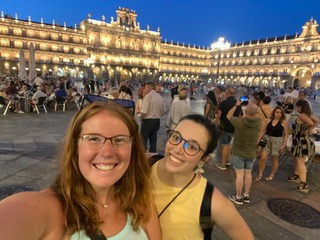
The first night that I arrived in Salamanca, my friend Ana took me on a tour downtown! I was amazed by how much the city lights up at night in comparison to the day!
Emily Nelsen is a graduate student at the University of California, Davis and an Associate Editor for Communications at Spanish and Portuguese Review. Below, Emily shares her experience attending the 105th AATSP Annual Conference.
* * *
At the end of June, I had the amazing opportunity to both attend and present at the 105th American Association of Teachers of Spanish and Portuguese (AATSP) Annual Conference in Salamanca, Spain. After recently completing my first year of my Master’s program in Spanish & Latin American Literatures and Cultures at the University of California, Davis, the AATSP conference served as an excellent experience for me to learn different techniques to improve my teaching practices and receive feedback on my work.
On Monday, June 26th, I presented my own work titled “Commemorative Palimpsests in Post-Authoritarian Argentina: The Case of ESMA”. I was appreciative of everyone who supported me, especially on the first day of the conference at the 9:00am session, and I also appreciated the insightful questions that session attendees and conference participants asked me about the future of my investigation. At the conclusion of my presentation, I leveraged one of the many networking opportunities at the conference by connecting with a high school teacher who, like myself, is interested in learning more about the value of pedagogies at the intersection of language, art, and trauma when teaching difficult and discomforting topics, such as human rights violations, in caring and critical ways. I am looking forward to finally traveling to Buenos Aires, Argentina in less than a week to complete fieldwork at ESMA, which serves as a historical national monument and a testimony to crimes against humanity committed during the dictatorship from 1976-1983.
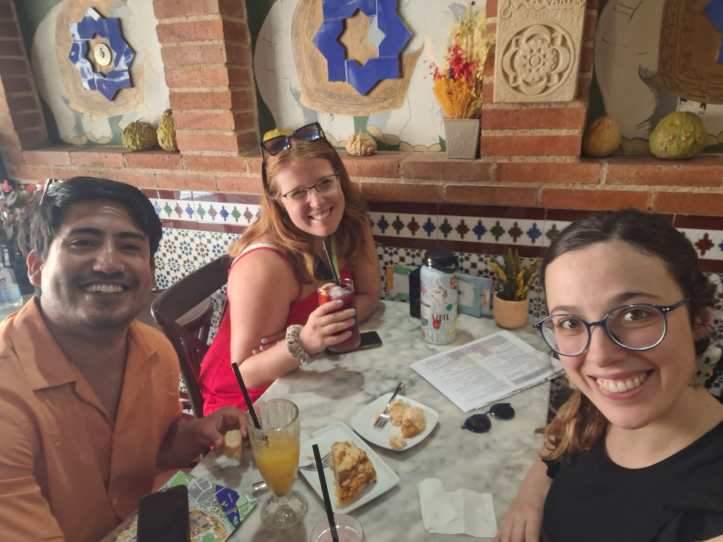
Celebrating with tapas after my presentation on Monday morning!
During the conference, I was blessed to attend other sessions with three other members of my department at the University of California, Davis who also presented, Cesar, Ana, and Sara. One of our favorite sessions was the keynote delivered by Kim Potowski. In this amazing session, Potowski highlighted the importance of instructors being aware of the many differences between heritage speakers and second language (L2) learners, especially as it pertains to differences in learning styles. Her presentation was powerful to me because since moving to California last August and beginning to teach, I have observed the presence of more heritage speakers than in my home state of Wisconsin. Potowski’s exposition demonstrated to me new practices to consider as I determine how to adjust my teaching practices to be cognizant of my students’ different learning needs, a topic that I am excited to explore more in a Special Topics linguistics class related to heritage speakers this fall in my department.
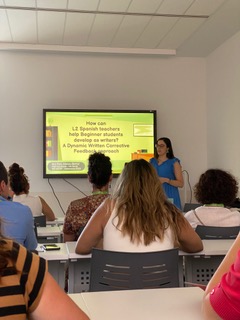
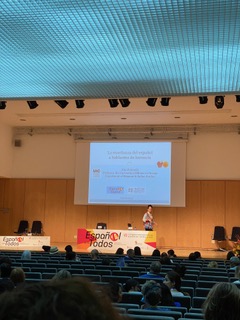
As I strive to include more social justice topics and practices in my teaching, I decided to attend various sessions related to this theme. One of the sessions that I enjoyed was entitled “Justicia social en la clase de español: cargada de ideología política?” delivered by Elena Lanza and Reyes Morán from Northwestern University in Chicago, Illinois. Lanza and Morán created a textbook that is available online for free and offers methods for teaching about social justice in the context of Latin America. The authors’ hard work to produce this free resource, that is arguably beneficial for high school and college students alike, is truly admirable, and I hope to use some of the questions and themes that they have outlined in my future classes as a graduate student who is interested in human rights in Latin America.
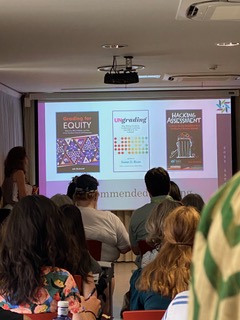
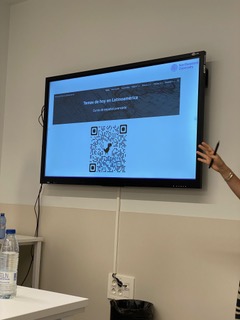
Besides the conference, my experience in Salamanca was particularly special due to the generous hospitality of my friend from Davis, Ana, and her family. From the moment that I arrived on Saturday, June 24th, I was greeted with open arms by Ana and her mom as we explored iconic and cherished monuments in the city including the Salamanca Catedral, Plaza Mayor, Casa de las Conchas, Casa Lis, and the University of Salamanca. On Sunday morning, after noticing the abundance of frog key rings, t-shirts, mugs, and other souvenirs, I discovered the infamous “frog on the facade.” The frog on the facade can be found on the main university building’s most famous architectural pieces, La Puerta de Salamanca. From former teachers and friends who studied at the University of Salamanca, I learned that the frog represents good luck and if students managed to locate the frog on the intricately adorned facade without any help, they would pass their exams and have a successful academic career.
I was absolutely mesmerized by Ana’s incredible insight into historical landmarks in the city and grateful for her efforts to ensure that my other colleagues and myself from Davis had an amazing experience. Because the majority of Ana’s family is originally from Salamanca, on Tuesday night, her family hosted a cena at her aunt’s home which has an amazing view of the Salamanca Catedral. Ana and her mother prepared numerous traditional dishes including croquettes, jamón ibérico and ensalada rusa, just to name a few. It was quite the Spanish feast that was complemented by fascinating conversation with her family about their history and love for Salamanca. Because of the efforts of Ana and her family and the AATSP conference, the city of Salamanca itself will forever hold a special place in my heart.
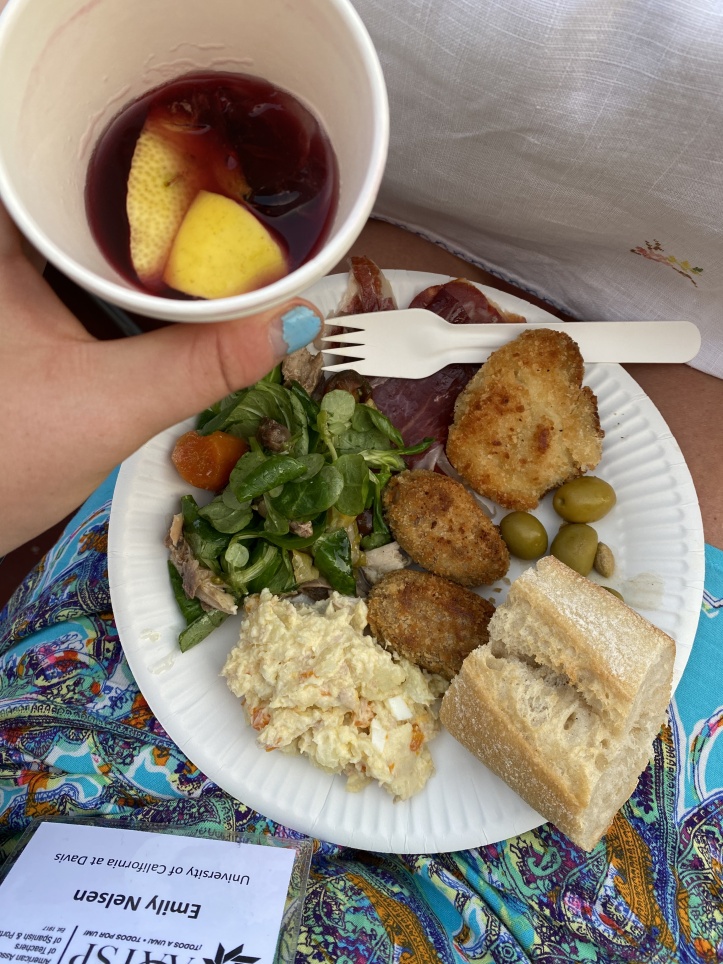
La cena with Ana’s family!
Thinking back on my week in Salamanca, I am incredibly grateful, thankful, and blessed to have been given the opportunity to travel to Spain for the first time, present my own work, and learn from others about how to improve my teaching practices. As a scholar and educator myself, I strive to continuously grow my awareness in how to best deploy pedagogical practices that will include and assist ALL of my students in their own language acquisition journey. Going into my second year of teaching at UC Davis and my final year of my Master’s program, I am confident that I have acquired knowledge and tools that will help me employ social justice practices and themes in the classes I teach, while approaching my teaching with empathy and consideration for each individual student. Thank you, AATSP, and everyone in Salamanca, for inspiring me to continue learning about the needs of today’s learners and educators through focusing on innovative programs, emerging trends, and research-informed practices.
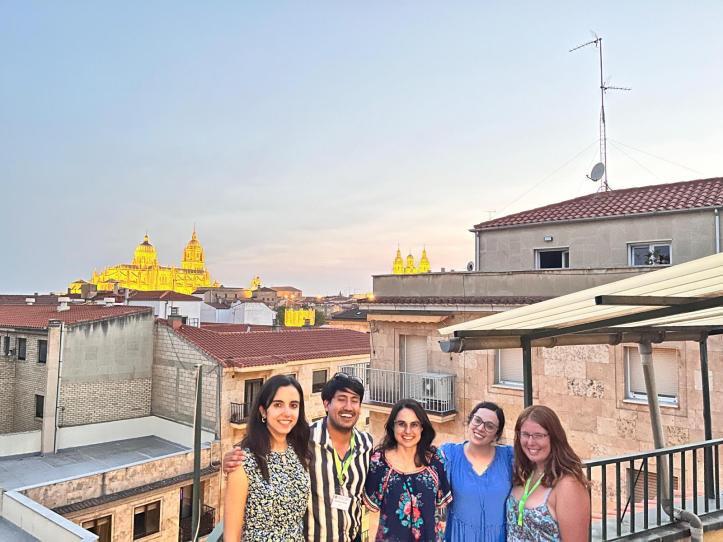
Photo with my fellow colleagues who presented from UC Davis at the AATSP Conference!
I am also looking forward to the opportunity to hopefully present at the 106th AATSP Annual Conference which will be held from June 29 – July 2, 2024 in Portland, Oregon! The 2024 theme, El español y el portugués como lenguas globales: conexiones y oportunidades más allá del aula, O espanhol e o português como línguas globais: conexões e oportunidades além da sala de aula, or Spanish and Portuguese as Global Languages: Connections and Opportunities in the Classroom and Beyond, will inevitably serve as incredible experiences for graduate students and instructors alike to share how our in-class activities can inspire our students to take action outside of the classroom and contribute to society in culturally competent ways. Please stay tuned for more information on our Instagram @aatsp_spr, Facebook (Spanish & Portuguese Review), and Twitter @aatsp_spr for announcements regarding the call for proposals in early fall.
* * *
Emily Nelsen is a second year Masters student at the University of California, Davis. Her research interests include Latin American literature and cultural studies; post- authoritarianism in Argentina and commemorative palimpsests at ESMA; politics of memory, trauma, violence, and human rights in the Southern Cone.

Enjoyed reading about your trip and experiences.
While at the University I wrote my Thesis on Transformational Grammar by studying the greatest Linguists in the World.
Sounds like you have been learning about Linguistics too 😊
LikeLike
Thank you for reading our blog post and thanks for your comment!
LikeLike
[…] to SPR have written about the professional development opportunities at the 2021, 2022, and 2023 AATSP […]
LikeLike